The fast growth of biotechnology has brought us many new chances over the last ten years. Now, we have medical biotech to help and agri-biotech to make food more secure. But, biotechnology also makes us think hard about biosafety, biosecurity, and doing the right thing, called biotech ethics.
The COVID-19 outbreak showed how important biotechnology is for health worldwide. New genetic engineering and CRISPR technologies let us act fast. We can make medical countermeasures and care focused on each person’s needs. Still, making bad things like biological weapons is now a big worry. Leaders and scientists are working to face this danger together.
In farming and the environment, biotechnology helps solve issues like food security, safe materials, and cleaning the environment. Yet, what people think and the rules about agricultural biotech are not simple. People still discuss if genetically modified organisms (GMOs) are safe and right.
We are treading new ground in biotechnology. It’s important to think about the good and the bad, and to make strong rules that make sure we use this tech right.
Key Takeaways:
- Biotechnology offers new options for health, farming, and the world we live in. But it also makes us worry about safety.
- The COVID-19 outbreak showed us how vital biotechnology is for creating health defenses and treatments that fit each person.
- Agricultural biotechnology can make our food and the way we grow it better and safer. Yet many are still unsure if it’s a good idea.
- Being careful and thinking about what’s right is very important in the world of biotechnology that is always changing.
- New parts of biotechnology like genetic engineering and CRISPR can bring good or bad. It’s about how we use them.
Understanding Biotechnology: Scope and Applications
Biotechnology is a fast-growing field with the power to change how we live. It spans from improving healthcare to farming and keeping our world green. Scientists use this tech to make products and services through living things.
Definition and Scope
Biotechnology uses plants, animals, and tiny organisms to make new things. It includes fields like biomedical research, bioinformatics, and biopharmaceuticals. Its reach is wide, promising better health, food, and a cleaner planet.
Key Applications: Healthcare, Agriculture, and Environment
In health, biotech can make innovative diagnostics, vaccines, and medical countermeasures. This tackles big health issues. In farming, it can create genetically modified crops for better food and fighting hunger.
For our planet, environmental biotechnology means cleaner water purification and managing waste. It also helps create sustainable resources for the future.
“Biotechnology has the power to unlock the secrets of nature and transform our world in remarkable ways.”
The impact of biotech is huge, and it’s still growing. But, we must consider its ethics and regulations too. By learning about biotechnology, we see how it shapes our world and fosters good changes around us.
Biotechnology in Healthcare: A Lifesaving Revolution
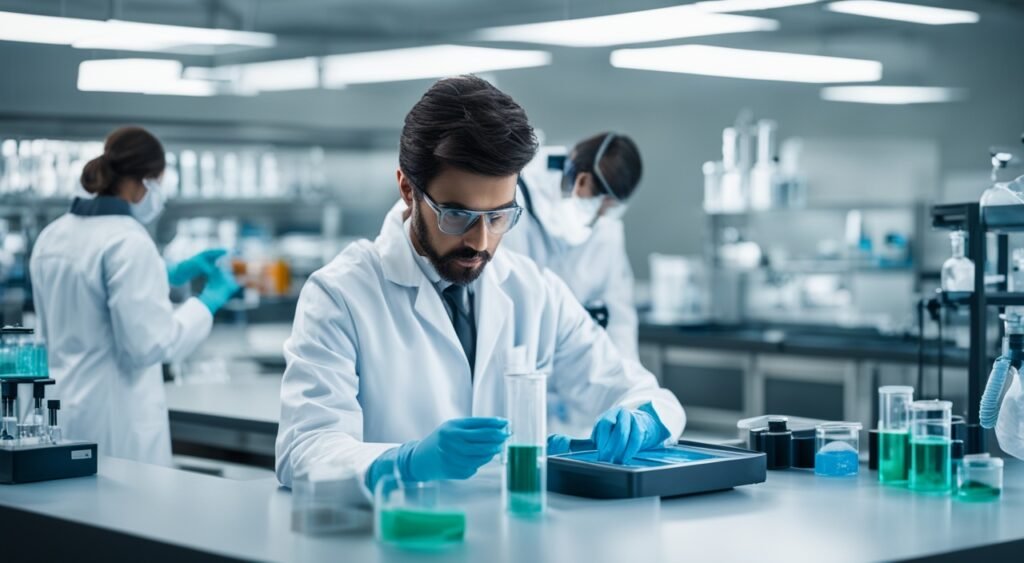
Medical biotech and personalized medicine are changing healthcare. They’ve brought new ways to diagnose, create vaccines, and fight diseases. The fight against COVID-19 showed us how crucial they are in global crises.
Novel Diagnostics, Vaccines, and Medical Countermeasures
Biotechnology is speeding up how we make tests, vaccines, and treatments. Thanks to tools like mRNA, we made COVID-19 vaccines quickly. Also, gene engineering aids in developing faster diagnostics.
These tech advances are reshaping our healthcare. They let us personalize treatments for better results. By using medical biotech, doctors can save more lives and make communities healthier.
Gene Drives for Vector-Borne Disease Control
Biotech is also tackling diseases like malaria and dengue. Gene drives are a big step in controlling these illnesses. They can edit mosquitoes’ genes to stop the diseases they spread.
This method could change our fight against these diseases. It might lower their global impact, saving many lives. We’re likely to see more big advances from medical biotech against health issues.
Agricultural Biotechnology: Combating Hunger and Malnutrition
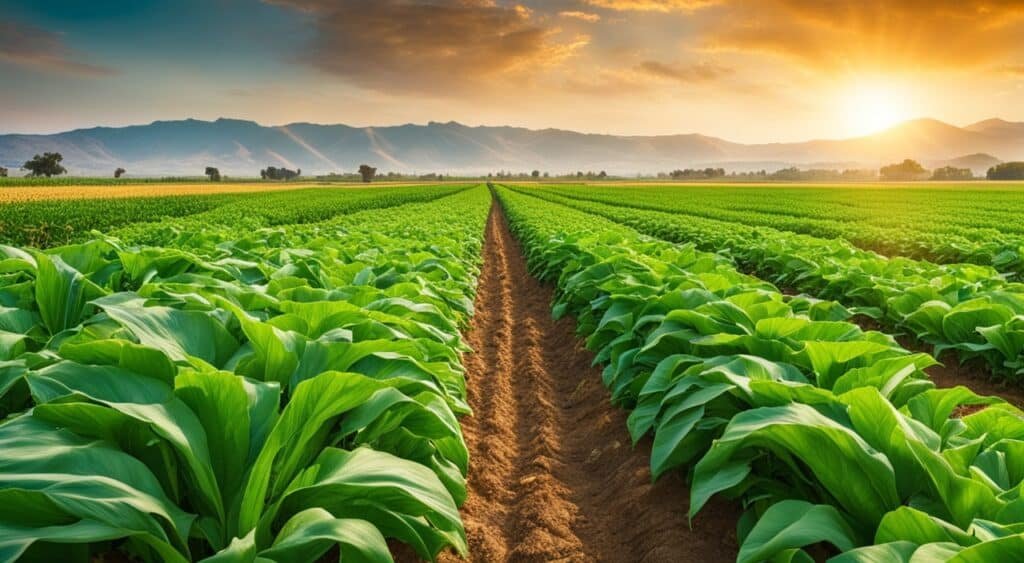
Agri-biotech is changing how we farm and secure our food worldwide. By using innovative genetic methods, we can create crops that grow better, are more nutritious, and can fight off tough conditions. This means we can produce more food that’s healthier and more resilient.
Genetically Modified Crops for Improved Yields and Nutrition
Before, we relied on methods like selective breeding to improve crops. Now, genetic engineering allows us to edit specific genes in a plant’s DNA. This way, we get crops that are heartier, more nutritious, and grow better than ever before.
Take golden rice for instance. It’s a special type of rice engineered to make beta-carotene, which is turned into vitamin A by our bodies. This can help fight vitamin A deficiency, stopping a main cause of blindness in poor countries. GM crops also include those that can handle droughts, fight off pests, and produce more food. These advances don’t just make food more available but also help farmers earn more, breaking the cycle of poverty.
Sustainable Agriculture and Food Security
Biotechnology also encourages farming that’s good for the environment. Crops that need fewer chemicals lessen the harm farming does to the earth. This helps keep our planet healthier and more biodiverse. Plus, by making crops grow better on the land we already use, we are saving new wild spaces from being turned into farms.
With more and more people to feed, the benefits of agri-biotech are vital. By using safe technologies and following sound rules, we can fight hunger and malnutrition. These efforts make a big difference for people today and help protect the earth for our children and their children.
| Trait | Benefit | Example Crop |
|---|---|---|
| Increased Yield | Improved food production to meet global demand | High-yielding corn and soybean varieties |
| Enhanced Nutrition | Addressing micronutrient deficiencies and malnutrition | Golden rice with increased vitamin A |
| Stress Tolerance | Resilience to environmental factors like drought and pests | Pest-resistant Bt cotton and drought-tolerant maize |
Agri-biotech offers great hope in our fight against global hunger and malnutrition, all while promoting an agriculture that’s gentle on our planet. As science moves forward, the future of our food looks brighter than ever.
“Biotechnology has the potential to address some of the most pressing challenges facing humanity, from hunger and malnutrition to climate change and environmental degradation.”
Environmental Biotechnology: A Green Solution
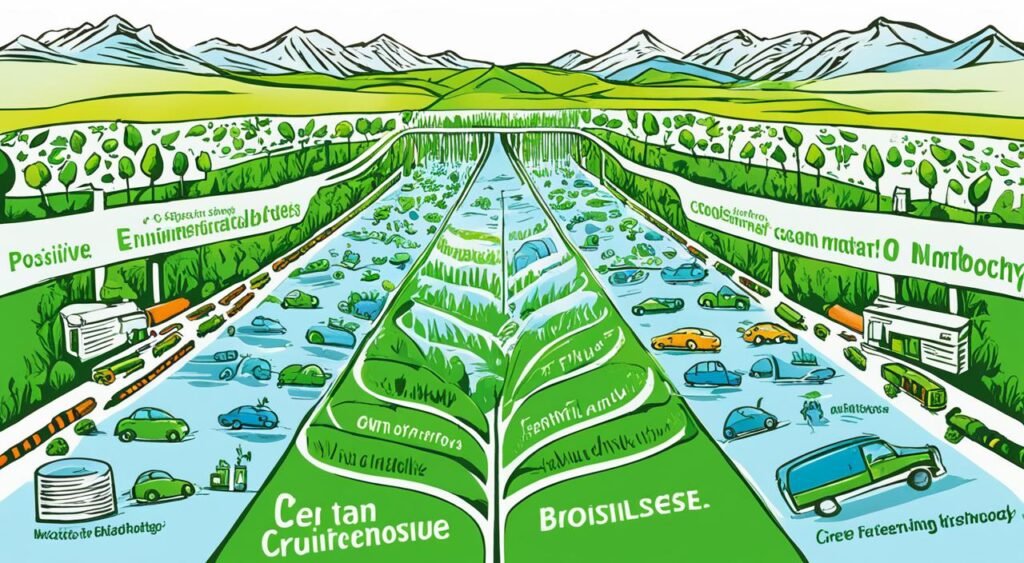
In the quest for a better future, environmental biotechnology stands out. It uses microbes to solve many environmental problems. This offers a green choice instead of harmful chemical methods.
Plastic pollution is a big issue today. But, enviro-biotech can help with its amazing abilities. Bacterial enzymes can break down the materials in plastic bottles. This could lead to less waste and a better environment.
Sustainable biotech has also given us bioplastics. They come from plants, vegetables, and even recycled materials. These are great because they’re not made from oil, significantly cutting down on pollution from plastics.
Then there’s bioremediation, a method that cleans up waste with microorganisms. It helps handle waste from industries and farms. This not only makes our world cleaner but also helps reuse waste, adding value to the circular economy.
The idea of biofuels from natural sources excites many. These fuels are better for the environment than fossil fuels, cutting down on pollution. It’s an important step towards a future with lower emissions.
With our planet facing several dangers, environmental biotechnology offers hope. It uses nature to fight pollution, manage waste better, and find clean energy. By using these new ways, we can make our world cleaner, greener, and stronger.
“Environmental biotechnology has the potential to revolutionize the way we address environmental challenges, transforming waste into valuable resources and paving the way for a more sustainable future.”
Biotechnology: From Lab to Market
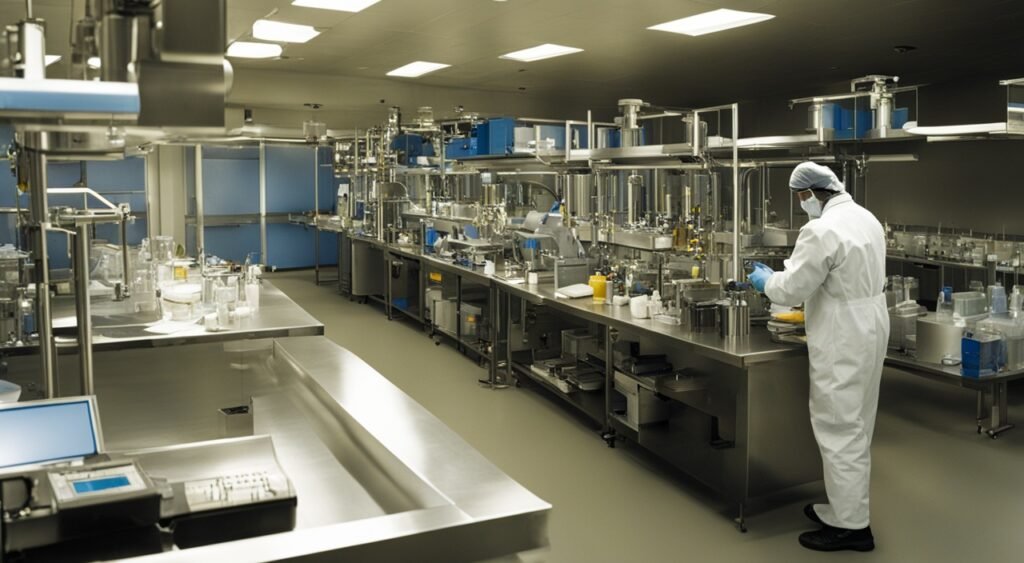
Turning top-notch biomedical findings into helpful treatments is called translational medicine. It involves tests on animals and big studies with people to prove new therapies are both safe and work well.
Translational Medicine and Clinical Trials
Getting from biomedical research to the market is tricky. It involves jumping through regulatory hoops and meeting important scientific standards. First, researchers show their new ideas in animals. This gives them clues on how treatments might work in people.
Then, clinical trials with humans begin. These confirm if the treatment is safe, how much to take, and if it works. Only if these steps pass can new treatments get the green light from agencies like the FDA.
Agricultural Biotechnology Regulations and Public Perception
Making it to the market with agricultural biotechnology faces extra challenges, like GMO crops. The path is tougher due to regulations, especially in the EU, and a mix of opinions. Laws often change because of what people think and activist groups.
Companies in this field work hard to prove their products are safe and good for the public. It’s tough, but helping folks understand the benefits is key to success.
The journey from fresh biomedical research to solving real-world problems is filled with tests and rules. Handling changing public concerns is vital. By facing and dealing with these, the biotech sector can make big changes, improving health and farming, among other areas.
Safety and Security Threats Emerging From Biotechnology
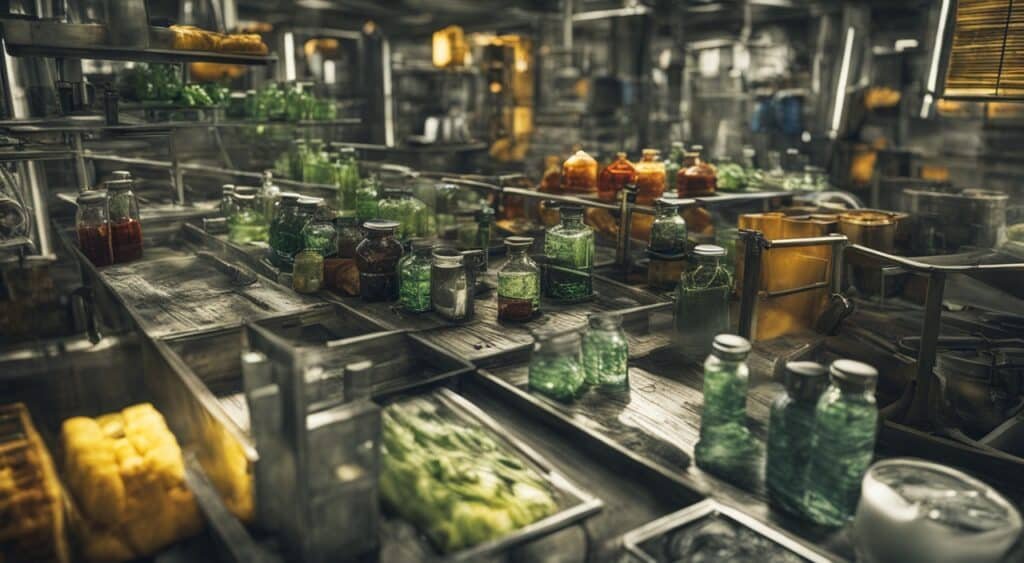
Biotechnology is growing fast, especially in DNA work like sequencing and editing with tools like CRISPR/Cas9. But there are worries about the safety and security risks these new techs bring, even though they can greatly help in health, farming, and the environment. Issues like the accidental spread of modified organisms are a big concern.
Accidental Release and Unintended Consequences
Accidentally letting out genetically modified organisms is a main worry. This could happen in labs or when things don’t go as planned outdoors. Over the years, there have been cases where such leaks caused infections or outbreaks. Such events show the importance of having strong safety steps in place.
Biosafety Concerns and Historical Incidents
There’s also fear about how these biotech tools could be used badly. Past events, like the anthrax issues in the 1970s and 2001, remind us of the dangers. These acts were not just harmful but show the risks if not handled properly.
The biotech field keeps getting bigger. Those in charge, from leaders to experts, need to make sure things are safe and used right. This includes strict safety rules, deep checks on risks, and always watching how these new tools are used.
“The accidental release of pathogens can have devastating consequences, underscoring the need for robust biosafety protocols and oversight.”
Biotechnology: Increasing Food Security and Understanding
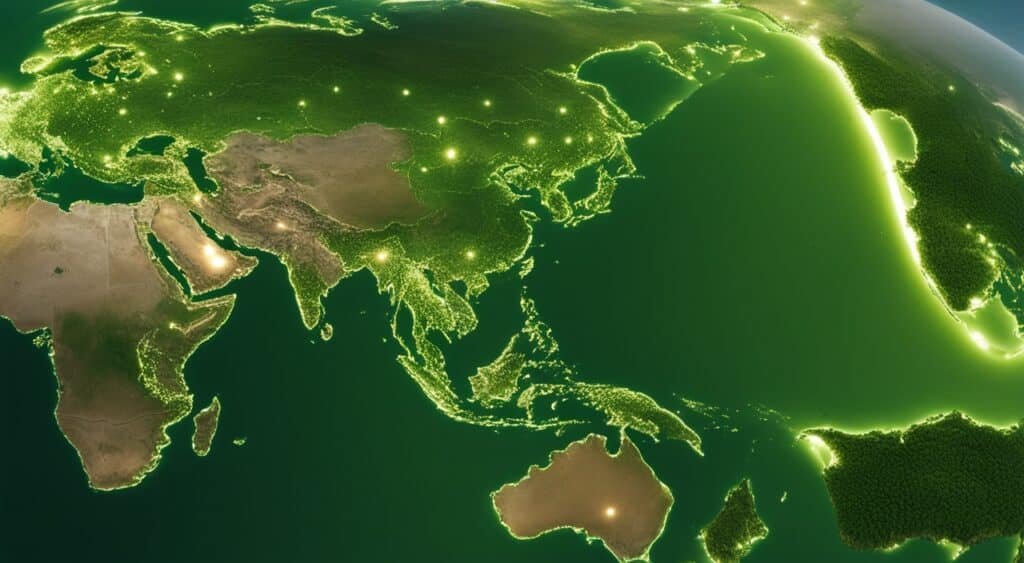
The world’s population is growing fast. It’s expected to hit nearly 10 billion by 2050. To keep up, we need to produce more food. Food security and sustainability face many challenges. But biotechnology in agriculture can help solve these issues.
Meeting Global Food Demands
Biotechnology has many benefits for agriculture. It helps increase productivity and meet global food demands. What are some of these advantages?
- It helps reduce the need for insecticides, saving biodiversity and the environment.
- Plants become better at handling droughts, floods, and other stressors.
- The nutritional value of crops can be improved, which fights malnutrition.
- Yield growth is boosted by using genetic enhancements.
These improvements could change how we ensure food security globally. They let us produce enough food to feed more people, sustainably.
Promoting Acceptance Through Science-Based Regulations
Many still doubt the safety and potential of biotechnology in agriculture. Addressing these concerns is vital. Developing science-based, risk-proportionate regulations for biotech crop cultivation and trade is key.
Regulatory bodies worldwide have tested and confirmed the safety of many biotech crops for us and the environment.
By using regulations that are transparent and evidence-based, public trust can grow. This trust is crucial for unlocking biotechnology’s benefits for global food security.
Feeding the world’s expanding population is a difficult task. Biotechnology presents a hopeful way to produce more and better food. With clear regulations and public education, biotechnology can lead us to a secure and sustainable food future.
Ethical Considerations in Biotechnology Research

The area of biotech ethics is growing fast. It includes fields like gene editing and synthetic biology. It’s vital to think about the ethical considerations of this work. Policymakers and scientists need to talk it out. They should make sure biotechnology grows in an ethical way. This means weighing the good it can do against the possible problems.
A big issue in biotech ethics is human enhancement. Changing the human genome raises ethical questions. These include what’s okay to change in medicine and the chance of creating a split in society. There’s also concern about how gene tweaks might affect people down the line.
Biotechnology could be misused. There’s a worry it might lead to biological weapons or letting dangerous organisms loose by mistake. So, strict rules and strong safety measures are key. They would help keep the use of these new technologies safe and ethical.
Easy access to biotechnology’s benefits is also a key concern. Some fear that if new tech is too expensive or hard to understand, only some people will get to use it. This could make health and social gaps worse. It means only the rich and lucky could benefit.
To tackle these ethical considerations, we need clear rules and honest discussions. Many different people should be involved, from ethicists and policymakers to scientists and community leaders. Open talks are crucial. With everyone’s ideas, we can make sure biotech ethics serves everyone well.
“The potential benefits of biotechnology are immense, but we must approach its development and application with the utmost care and consideration for the ethical implications.”
Advancements in biotechnology make ethical considerations even more critical. We need to balance the good these new technologies offer with our shared values. This way, everyone can benefit from biotech ethics, and we can address the risks wisely.
Also Read : What’s The Cloud And How Does It Store Data?
The Future of Biotechnology: Opportunities and Challenges
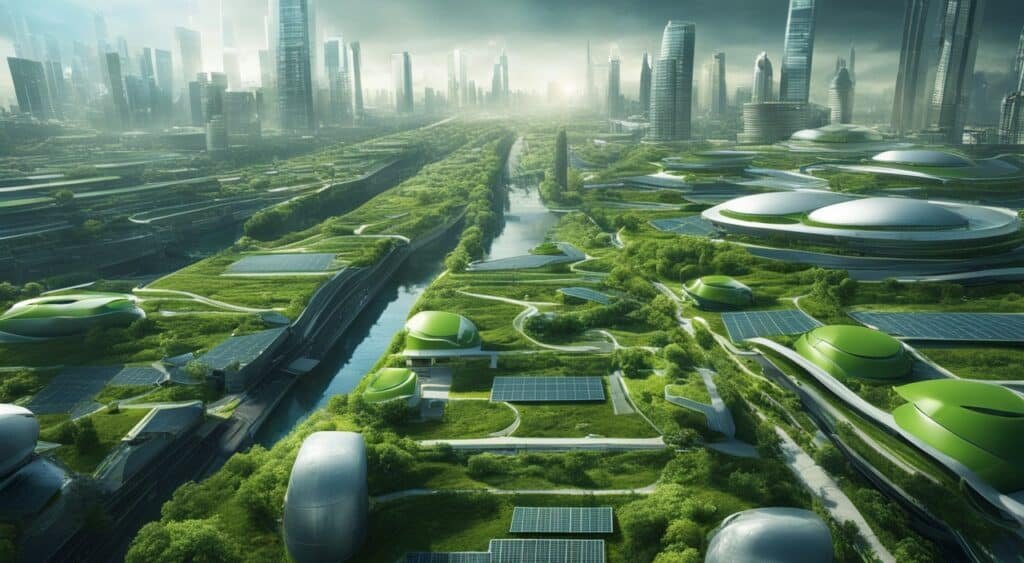
Biotechnology is growing fast, showing great promise in healthcare, farming, and the environment. Yet, it also brings new opportunities and hurdles. Meeting these challenges will need a team effort from leaders, scientists, and society.
Unraveling the Opportunities
In the medical world, we are on the brink of some major discoveries and treatments. Gene editing tech like CRISPR could change how we fight genetic issues and rare sicknesses, giving hope to vast numbers. Also, we’re looking at biofuels from plants and new farm practices that are eco-friendly. These steps could lead us to a future that’s greener and safer for everyone.
Navigating the Challenges
While biotech’s future is bright, it must deal with many issues, like rules, what people think, and safety. It’s very important to develop this area in a way that’s responsible and ethical. This means figuring out how to encourage new ideas while keeping the public safe and happy.
There’s also the worry about biotech being used the wrong way or getting out accidentally. To tackle this, we’ll need strong safety measures and plans to handle risks well. Building trust in these innovations is key to their success and use.
Embracing Collaboration and Interdisciplinary Approaches
For biotech to really benefit us and manage its risks, everyone must pitch in. This includes leaders, scientists, doctors, and the general public. We have to work together to make solid rules, boost science education, and talk openly about the big issues these new technologies bring up.
With everybody working together and staying alert, biotechnology’s future could truly change our world for the better. It could help us all live healthier, in a greener place, and with fairness for everyone.
| Opportunities | Challenges |
|---|---|
|
|
“The future of biotechnology holds the potential to transform our world in unprecedented ways, but it is up to us to guide its development responsibly and ethically.”
Conclusion
Biotechnology is a fast-growing field. It helps solve big global issues in health, farming, and the environment. Safety, security, and ethics must always be top priorities as we use this technology.
We need to fully understand what biotechnology can do. This way, we use it fully while keeping risks in check. Bringing together scientists, leaders, and the public is key. It helps make rules based on science and builds trust in new technologies.
The future with biotechnology looks bright. It will change how we do health, grow food, and take care of our planet. By grabbing the chances and facing problems, we can make the world stronger and fairer.
FAQs
What are the key benefits of biotechnology?
Biotechnology can change how we care for our health, grow our food, and protect our planet. It makes new ways to detect and fight diseases. It also helps create foods that are better for us and the planet.
It can even help clean up pollution using tiny organisms. This tech offers a bright future for many areas of our lives.
What are the potential risks and safety concerns associated with biotechnology?
The fast growth of biotech, like editing genes, comes with worries. We might accidentally let out engineered organisms that could harm us. This might happen in labs or in nature.
Experts and rule-makers work hard to keep everyone safe as biotech advances. They face tough choices to balance its benefits and risks.
How is biotechnology being used to address global challenges in healthcare?
In health, biotech is creating smart tests, effective vaccines, and strong responses to diseases. Right now, it’s helping fight COVID-19. Special gene editing is also used to fight diseases spread by bugs, like malaria.
What are the applications of biotechnology in agriculture?
Biotech helps make plants that give more food, are more nutritious, and fight off bugs and diseases. This is key to feeding the world and doing it in a way that’s better for our planet. It cuts down on harmful chemicals used in farming.
How can biotechnology help address environmental challenges?
For the environment, bio-tech uses small organisms to clean up different kinds of waste. This is much greener than older, often harsher methods. It’s also used against plastic waste. Some special bacteria can eat plastic, or we can make plastic from things that can grow back.
What are the ethical considerations surrounding biotechnology research?
As we make more progress in biotech, we must think hard about the right and wrong of it. This means being very careful in how we use these powerful tools. People who make rules and scientists talk a lot to make sure biotech is good for everyone without causing new problems.
How are regulatory frameworks and public perception shaping the development of biotechnology?
The rules around biotech, especially in farming, change a lot because of what people think and because the rules are not always clear. Companies have to prove their products are safe in this complex situation. Making rules that are fair and clear, based on good science, is key to help biotech keep improving our lives.
